Copper oxychloride
- CAS NO.:1332-40-7
- Empirical Formula: Cl2Cu.3CuH2O2
- Molecular Weight: 427.13
- MDL number: MFCD00151229
- EINECS: 215-572-9
- SAFETY DATA SHEET (SDS)
- Update Date: 2025-07-04 15:32:53

What is Copper oxychloride?
Chemical properties
Green solid
Chemical properties
Bluish-green powder. Odorless
Agricultural Uses
Fungicide: Used to control fungi on beets, fruit crops, grapes, olive trees, potatoes, vegetables, tomatoes, ornamental plants and many more. Used as a bird repellant.
Trade name
AGRIZAN®; BASF® GRUNKUPFER; BLITOX®; BLITOX® 50; BLUE COPPER-50®; CHEMOCIN®; CHEMPAR®; COBOX®; COBOX BLUE®; COLLOIDOX®; COPPERSAN®; COPPESAN®; COPPESAN BLUE®; COPRANTOL®; COPREX®; COPROSAN BLUE®; COP-TOX®; COXYSAN®; CU-56®; CUPRAL 45®; CUPRAMAR®; CUPRAMER®; CUPRANTOL®; CUPRAVET®; CUPRAVIT®; CUPRAVIT® FORTE; CUPRAVIT GREEN®; CUPRICOL®; CUPRITOX®; CUPROKYLT®; CUPROL®; CUPROSAN®; CUPROSANA®; CUPROSAN BLUE®; CUPROVINOL; CUPROX®; CUPROXOL®; DEVICOPPER®; FALIGRUEN®; FYCOL 8®; FYTOLAN®; KAURITIL®; KILEX®; KT 35®; KUPRICOL®; KUPRIKOL®; MICROCOP®; MIEDZIAN®; MIEDZIAN 50®; NEORAM BLU®; OXICOB®; OXIVOR®; OXYCLOR®; OXYCUR®; PARRYCOP®; PEPROSAN; RECOP®; RHODIACUIVRE®; SUTOX®; TAMRAGHOL®; TRICOP 50®; VIRICUIVRE®; VITIGRAN®; VITIGRAN BLUE®
Potential Exposure
Used to control fungi on beets, fruit crops, grapes, olive trees, potatoes, vegetables, tomatoes, ornamental plants, and many more. Used as a bird repellant
Shipping
UN3077 Environmentally hazardous substances, solid, n.o.s., Hazard class: 9; Labels: 9-Miscellaneous hazardous material, Technical Name Required.
Incompatibilities
When heated to decomposition or on contact with acids or acid fumes, may produce highly toxic chloride fumes and deadly phosgene gas. May cause pitting of some metals
Waste Disposal
Copper-containing wastes can be concentrated through the use of ion exchange, reverse osmosis, or evaporators to the point where copper can be electrolytically removed and sent to a reclaiming firm. 916 Copper Oxychloride Details of copper recovery from a variety of industrial wastes have been published. If recovery is not feasible, the copper can be precipitated by the use of caustics and the sludge de posited in a chemical waste landfill. Recommendable methods: Precipitation, solidification, landfill, discharge to sewer, & incineration. Peer-review: Precipitate copper with alkali, filter, solidify precipitate. (Do not use ammonia as alkali). Cation exchange will allow recovery of copper. Eluate from cation exchanger can be passed through anion exchanger to remove (or reduce) naphthenic acid content. Exhausted ion exchange resins can be landfilled. (Peer-review conclusions of an IRPTC expert consultation)
Properties of Copper oxychloride
| solubility | insoluble in H2O; soluble in acid solutions,NH2OH
4 |
| form | powder |
| color | blue-green |
| Water Solubility | insoluble H2O; soluble acids, ammonia [HAW93] |
| CAS DataBase Reference | 1332-40-7(CAS DataBase Reference) |
| EPA Substance Registry System | Basic copper chloride (1332-40-7) |
Safety information for Copper oxychloride
| Signal word | Warning |
| Pictogram(s) |
 Environment GHS09 |
| GHS Hazard Statements |
H410:Hazardous to the aquatic environment, long-term hazard |
| Precautionary Statement Codes |
P273:Avoid release to the environment. P391:Collect spillage. Hazardous to the aquatic environment P501:Dispose of contents/container to..… |
Computed Descriptors for Copper oxychloride
Copper oxychloride manufacturer
Ambachem Industries
New Products
4,4-Difluoropiperidine hydrochloride tert-butyl 9-methoxy-3-azaspiro[5.5]undecane-3-carboxylate Indole Methyl Resin N-Isopropylurea N,N-Dicyclohexylcarbodiimide(DCC) MELDRUMS ACID 5-METHYLISOXAZOLE-4-CARBOXYLIC ACID Magnessium Bis glycinate Zinc ascorbate 1-bromo-2-butyne 2-acetamidophenol 9(10H)-anthracenone Erythrosin B, 4-Piperidinopiperidine 2-((4-morpholinophenylamino) (methylthio) methylene) malononitrile 2,4-dihydroxybenzaldehyde 3-(4-morpholinophenylamino)-5-amino-1H-pyrazole-4-carbonitrile Methyl 2-methylquinoline-6-carboxylate 2,6-dichloro-4-nitropyridine 4-Bromo-2-chlorobenzonitrile 2-(benzylamino)acetic acid hydrochloride 4-(tert-Butoxycarbonylamino)but- 2-ynoic acid 3,4-dihydro-2H-benzo[b][1,4]dioxepine 1-Phenyl-1-cycloprppanecarboxylicacidRelated products of tetrahydrofuran
![Amides, coco, N-[3-(dimethylamino)propyl], N-oxides](https://img.chemicalbook.in/)
![Imidazolium compounds, 1-[2-(carboxymethoxy)ethyl]-1-(carboxymethyl)-4,5-dihydro-2-norcoco alkyl, hydroxides, sodium salts](https://img.chemicalbook.in/)

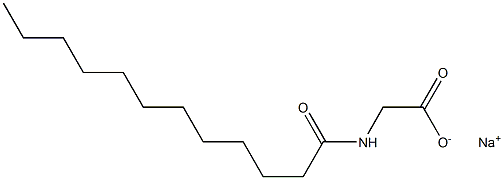




You may like
-
 Copper chloride oxide CAS 1332-40-7View Details
Copper chloride oxide CAS 1332-40-7View Details
1332-40-7 -
 copper oxychloride CAS 1332-40-7View Details
copper oxychloride CAS 1332-40-7View Details
1332-40-7 -
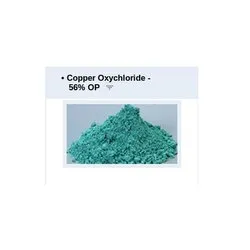 Parikh 56 ppm Copper Oxychloride 56% OP FungicideView Details
Parikh 56 ppm Copper Oxychloride 56% OP FungicideView Details
1332-40-7 -
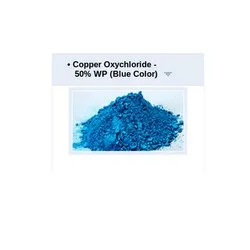 Parikh 50 ppm Copper Oxychloride-50% WP Blue Color FungicideView Details
Parikh 50 ppm Copper Oxychloride-50% WP Blue Color FungicideView Details
1332-40-7 -
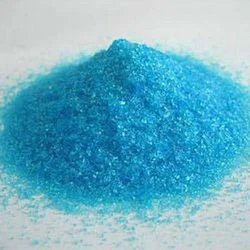 Copper Oxy Chloride, Cl2Cu.3CuH2O2View Details
Copper Oxy Chloride, Cl2Cu.3CuH2O2View Details
1332-40-7 -
 Copper Oxy ChlorideView Details
Copper Oxy ChlorideView Details
1332-40-7 -
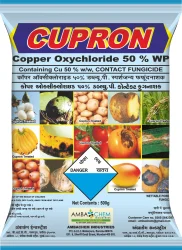 Ambachem Powder Cupron(Copper Oxychloride 50% WP), Packaging Type: Packet, Packaging Size: 500gView Details
Ambachem Powder Cupron(Copper Oxychloride 50% WP), Packaging Type: Packet, Packaging Size: 500gView Details
1332-40-7 -
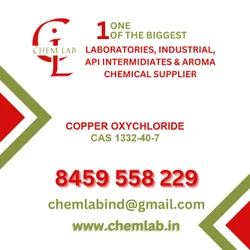 Copper Oxychloride PowderView Details
Copper Oxychloride PowderView Details
1332-40-7
